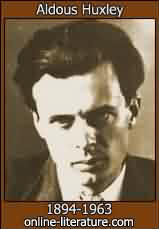 Aldous
Huxley (1894-1963), English
novelist and critic, best known for
his dystopian novel Brave New
World (1931). Besides novels he
published travel books, histories,
poems, plays, and essays on
philosophy, arts, sociology,
religion and morals. Aldous
Huxley (1894-1963), English
novelist and critic, best known for
his dystopian novel Brave New
World (1931). Besides novels he
published travel books, histories,
poems, plays, and essays on
philosophy, arts, sociology,
religion and morals.
Aldous Huxley was born in
Godalming, Surrey on July 26, 1894,
into a well-to-do upper-middle-class
family. His father, Leonard Huxley,
was a biographer, editor, and poet.
He first studied at Eton College,
Berkshire (1908-13). When Huxley was
fourteen his mother died. At the age
of 16 Huxley suffered an attack of
keratitis punctata and became for a
period of about 18 months totally
blind. By using special glasses and
one eye recovered sufficiently he
was able to read and he also learned
Braille. Despite a condition of
near-blindness, Huxley continued his
studies at Balliol College, Oxford
(1913-15), receiving his B.A. in
English in 1916. Unable to pursue
his chosen career as a scientist -
or fight in World War on the front -
Huxley turned to writing. His first
collection of poetry appeared in
1916 and two more volumes followed
by 1920.
Huxley's first novel, Crome
Yellow (1921), a witty criticism
of society, appeared in 1921.
Huxley's style, a combination of
brilliant dialogue, cynicism, and
social criticism, made him one of
the most fashionable literary
figures of the decade. In eight
years he published a dozen books,
among them Point Counter Point
(1928) and Do What You Will
(1929).
During the 1920s Huxley formed a
close friendship with D.H. Lawrence
with whom he traveled in Italy and
France. For most of the 1920s Huxley
lived in Italy. In the 1930s he
moved to Sanary, near Toulon, where
he wrote Brave New World, a
dark vision of a highly
technological society of the future.
In the1930s Huxley was deeply
concerned with the Peace Pledge
Union. He moved in 1937 with the
guru-figure Gerald Heard to the
United States, believing that the
Californian climate would help his
eyesight, a constant burden. After
this turning point in his life,
Huxley abandoned pure fictional
writing and chose the essay as the
vehicle for expressing his ideas.
Brave New World Revised
appeared in 1958. Huxley's other
later works include The Devils Of
Loudon (1952), depicting
mass-hysteria and exorcism in the
17th-century France. Island
(1962) was an utopian novel and a
return to the territory of Brave New
World, in which a journalist
shipwrecks on Pala, the fabled
island, and discovers there a kind
and happy people. But the earthly
paradise is not immune to the harsh
realities of oil policy. In 1963
appeared Literature And Science,
a collection of essays.
In 1954 Huxley published an
influential study of consciousness
expansion through mescaline, The
Doors Of Perception and became
later a guru among Californian
hippies. He also started to use LSD
and showed interest in Hindu
philosophy. In 1961 Huxley suffered
a severe loss when his house and his
papers were totally destroyed in a
bush-fire. Huxley died in Los
Angeles on November 22, 1963.
|

